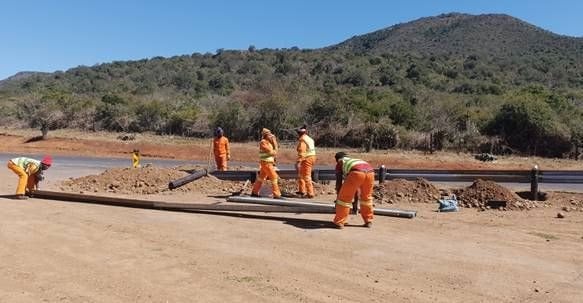
Top stories






Marketing & MediaBehind the campaign: Reframing fairness in ride-hailing: The inDrive success story
inDrive 2 days
More news

























Logistics & Transport
Uganda plans new rail link to Tanzania for mineral export boost

The 14-month road maintenance project, valued at R151m commenced in 2018 and is helping to create safer travel experiences for motorists in the area. This road connects the two towns of Fort Beaufort and Seymour along the route and is a vital link between Fort Beaufort and Queenstown.
“The installation of guard rails in the high fills as well as the construction of the Baddafort intersection has helped to improve the safety of the road. The stretch of the road was also fenced to prevent animals from crossing the road. This has made a significant change and has helped reduce the number of accidents on the road,” Mbulelo Peterson, SANRAL Southern Region manager said.
SANRAL took ownership of the R67, from Grahamstown to Queenstown, after it was declared a national road in 2012.
As part of its mandate, SANRAL is responsible for maintaining this important road.The average daily traffic on this road ranges from between approximately 600 and 700 vehicles per day in both the North and South directions.
The average percentage of heavy vehicles using this road is around 12.8 %. This means that approximately 89 trucks use the road in each direction every day.

Thirty SMMEs worked on the project and a total of 369 jobs were created.
“This was regarded as one of the most important road development projects in the area, over the last three years, since it created job opportunities for 369 people from the local communities,” Peterson said.
Project scope
Training and development
Target Enterprises (TEs) or Small Medium Micro Enterprises (SMME’s), who participated in this project, had to be registered with the Construction Industry Development Board (CIDB).
They were given tender training which was specific to their respective packages such as the construction of stone pitching, installation of guard rails, erection of fencing and gabions.
This training included a five-day intervention on Tendering for Construction Contracts and two extra days were provided for SMME’s that required additional assistance.
“As a requirement for this project, it was important that tenderers were familiar with the specification that relates to the transformation of the construction industry and adhered to the policies of Reconstruction and Development programmes and other similar Government initiatives,” Peterson said.
The Target Enterprise Management Team provided guidance and mentoring to the prospective tenders and an accredited training service provider was organised to provide the necessary training. SAQA accredited competency certificates and attendance certificates were awarded to the SMMEs.
Practical training was also organised for Targeted Enterprises (TEs). This included a two-day theory training and three-day practical skills training. The training was for fencing, guardrails, gabion and stone pitching.
All participants of the training attended that were deemed competent received SAQA accredited certificates.